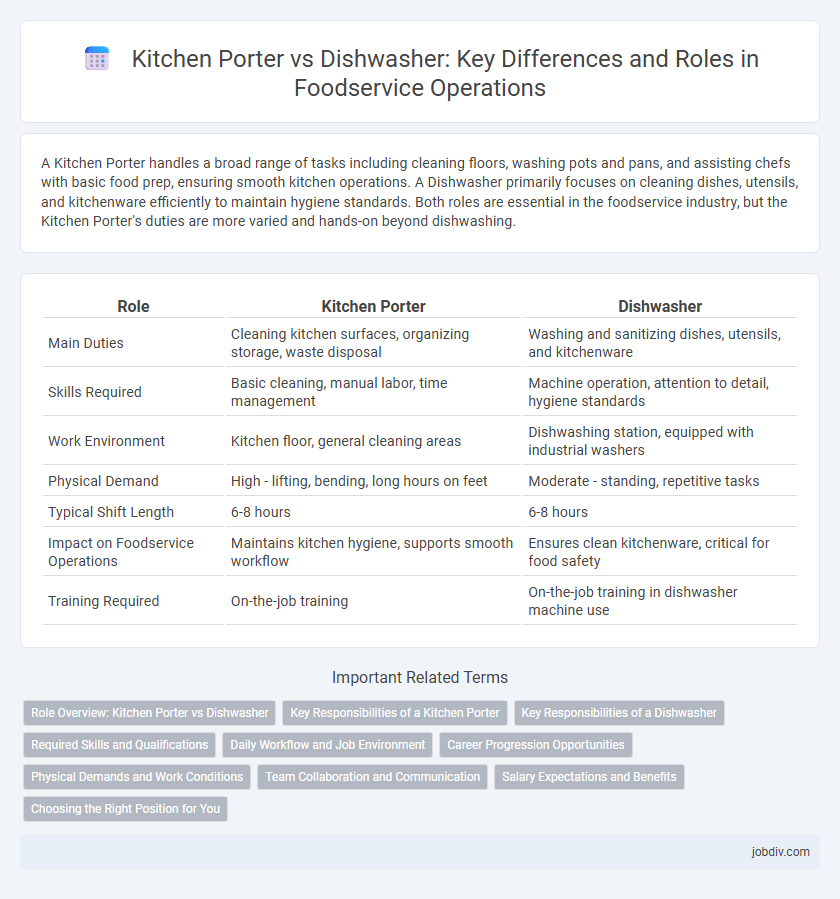A Kitchen Porter handles a broad range of tasks including cleaning floors, washing pots and pans, and assisting chefs with basic food prep, ensuring smooth kitchen operations. A Dishwasher primarily focuses on cleaning dishes, utensils, and kitchenware efficiently to maintain hygiene standards. Both roles are essential in the foodservice industry, but the Kitchen Porter's duties are more varied and hands-on beyond dishwashing.
Table of Comparison
| Role | Kitchen Porter | Dishwasher |
|---|---|---|
| Main Duties | Cleaning kitchen surfaces, organizing storage, waste disposal | Washing and sanitizing dishes, utensils, and kitchenware |
| Skills Required | Basic cleaning, manual labor, time management | Machine operation, attention to detail, hygiene standards |
| Work Environment | Kitchen floor, general cleaning areas | Dishwashing station, equipped with industrial washers |
| Physical Demand | High - lifting, bending, long hours on feet | Moderate - standing, repetitive tasks |
| Typical Shift Length | 6-8 hours | 6-8 hours |
| Impact on Foodservice Operations | Maintains kitchen hygiene, supports smooth workflow | Ensures clean kitchenware, critical for food safety |
| Training Required | On-the-job training | On-the-job training in dishwasher machine use |
Role Overview: Kitchen Porter vs Dishwasher
A Kitchen Porter supports kitchen operations by handling general cleaning, basic food preparation, and maintaining stock, ensuring a smooth workflow for chefs and kitchen staff. In contrast, a Dishwasher specializes in cleaning and sanitizing dishes, utensils, and kitchen equipment, playing a crucial role in hygiene and operational efficiency. Both roles are essential but differ in focus: Kitchen Porters have broader responsibilities involving kitchen maintenance, while Dishwashers concentrate exclusively on cleaning tasks.
Key Responsibilities of a Kitchen Porter
Kitchen Porters play a crucial role in foodservice by maintaining cleanliness, washing dishes, and assisting with basic kitchen tasks such as food preparation and stocking supplies. Their responsibilities extend to clearing tables, disposing of waste, and ensuring kitchen areas comply with health and safety regulations. Unlike dishwashers who primarily focus on cleaning dishes, Kitchen Porters support overall kitchen operations to enhance efficiency and hygiene standards.
Key Responsibilities of a Dishwasher
A dishwasher in foodservice is primarily responsible for cleaning and sanitizing all kitchen utensils, cookware, and equipment to maintain hygiene standards and prevent cross-contamination. They manage the dishwashing machine, ensure proper sorting of dirty dishes, and dispose of waste efficiently to support a smooth kitchen workflow. Maintaining a clean work environment and adhering to health and safety regulations are crucial elements of a dishwasher's key responsibilities.
Required Skills and Qualifications
Kitchen Porters require strong physical stamina, basic food safety knowledge, and effective communication skills to assist chefs and maintain cleanliness in busy kitchens. Dishwashers need attention to detail, proficiency with commercial cleaning equipment, and the ability to follow hygiene regulations rigorously. Both roles demand reliability, time management, and a commitment to maintaining a sanitary kitchen environment in foodservice operations.
Daily Workflow and Job Environment
Kitchen porters manage a broad range of tasks including food prep, cleaning kitchen surfaces, and organizing supplies, ensuring smooth daily workflow in busy foodservice environments. Dishwashers concentrate primarily on cleaning and sanitizing utensils, cookware, and dishware, maintaining hygiene standards critical to restaurant operations. Both roles demand physical stamina and teamwork but differ in task variety and interaction within the kitchen ecosystem.
Career Progression Opportunities
Kitchen porters gain foundational experience in food preparation and basic cleaning tasks, building essential skills that can lead to roles such as line cook or kitchen supervisor. Dishwashers primarily focus on sanitation and equipment maintenance, providing a pathway to positions like sanitation manager or kitchen porter with more operational responsibilities. Both roles offer valuable entry points into the foodservice industry, but kitchen porters often have broader exposure to culinary processes, enhancing career progression opportunities.
Physical Demands and Work Conditions
Kitchen porters typically undertake a wider range of physical tasks, including lifting heavy pots, cleaning floors, and assisting with food preparation, which requires stamina and strength in demanding work conditions. Dishwashers primarily focus on operating and maintaining dishwashing machines, involving repetitive motions, standing for extended periods, and working in hot, humid environments. Both roles often require long hours on their feet in fast-paced, noisy kitchens, with exposure to wet and slippery surfaces.
Team Collaboration and Communication
Kitchen porters and dishwashers play complementary roles that require effective team collaboration and communication to maintain kitchen efficiency. Kitchen porters often assist with basic food preparation and equipment cleaning, which demands clear communication with chefs and dishwashers to coordinate tasks and manage workflow. Strong collaboration between these roles helps prevent delays in service and ensures a clean, organized kitchen environment crucial for food safety standards.
Salary Expectations and Benefits
Kitchen porters typically earn an average hourly wage ranging from $9 to $12, with positions often including benefits such as meal discounts and flexible scheduling. Dishwashers generally command a slightly higher salary, between $10 and $14 per hour, and may receive additional benefits including health insurance and paid time off depending on the employer. Salary expectations for both roles vary by region and establishment size, with skilled dishwashers sometimes advancing to supervisory roles that offer higher compensation.
Choosing the Right Position for You
Choosing between a kitchen porter and a dishwasher depends on your preferred responsibilities and physical demands. Kitchen porters handle a wider range of tasks including cleaning, food prep assistance, and maintaining kitchen hygiene, requiring versatility and stamina. Dishwashers focus mainly on cleaning dishes and kitchen utensils quickly, ideal for those who prefer repetitive, detail-oriented tasks with less interaction.
Kitchen Porter vs Dishwasher Infographic

 jobdiv.com
jobdiv.com